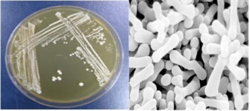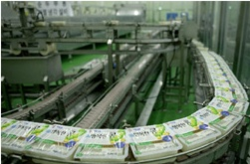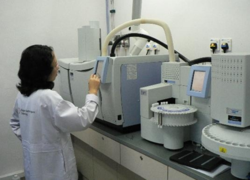- College of Engineering at Ewha Womans University
-
Coordinates: 37°33′59.14″N 126°56′54.08″E / 37.5664278°N 126.9483556°E
College of Engineering at Ewha Womans University Established 1996 Dean Kwang-Ok Kim Academic staff 54 (Apr. 2010) Undergraduates 1,097 (Apr. 2010) Postgraduates 138 (Apr. 2010) Location  Seoul, Republic of Korea (South Korea)
Seoul, Republic of Korea (South Korea)Campus 11-1 Daehyun-dong, Seodaemun-gu, Seoul, 120-750, Korea Affiliations Ewha Womans University Website eng.ewha.ac.kr The College of Engineering is one of eleven major academic divisions (or colleges) of the Ewha Womans University. Established in 1996 with four departments, Computer Science, Electronics Engineering, Environmental Science, and Architecture, the college currently offers B.S., M.S., and Ph.D. degrees.[1]
Contents
The college of engineering at Ewha Womans University was established in 1996 as the world’s first women’s college of engineering. Approximately 1,100 undergraduate and 120 graduate students have been studying at the college under the three divisions — Division of Computer & Electronics Engineering, Division of Architecture, and Division of Environmental & Food Science.
- 1980s
- - 1981: The Department of Computer Science founded in the College of Liberal Arts and Sciences
- 1990s
- - 1993: The Department of Environmental Science founded in the College of Natural Science
- - 1994: The Department of Electronics Engineering and the Department of Architecture founded in the College of Natural Science
- - 1996: Dean KiHo Lee takes office (first dean)
- - 1996: The College of Engineering founded. The four departments, Computer Science, Electronics Engineering, EnvironmentalScience, and Architecture transferred to the College of Engineering
- - 1996: The Department of Environmental Science renamed as the Department of Environmental Science & Engineering
- - 1997: Dean Yoon-Kyoo Jhee takes office (second dean)
- - 1998: The Department of Computer Science renamed as the Department of Computer Science & Engineering
- - 1999: Dean Yeoung-Soo Shin takes office (third dean)
- - 1999: The College of Engineering organized into 2 divisions: Computer Science & Electronics Engineering, and Architecture & Environmental System Engineering.
- 2000s
- - 2000: The Department of Electronics Engineering renamed as the Department of Information Electronics Engineering. The Department of Environmental Science & Engineering renamed as Environmental Science & Engineering Major School
- - 2000: System reorganized
- - 2001: Dean Seung Soo Park takes office (fourth dean)
- - 2003: Dean Yeoung-Soo Shin takes office (fifth dean)
- - 2005: Dean Yeoung-Soo Shin takes office (sixth dean)
- - 2006: School system reorganized.
- - 2006: The College of Engineering organized into 3 Divisions: Computer Information Communication, Architecture, and Environmental & Food Technology
- - 2006: The Department of Computer Science & Engineering and the Department of Information Electronics Engineering integrated into the Department of Computer Information Communication Engineering
- - 2006: The Department of Architecture divided into Architecture Design Major and Architectural Engineering Major
- - 2006: The Department of Environmental Science & Engineering and the Department of Food Sciences & Technology reorganized into the Division of Environmental and Food Technology
- - 2006: Introduced the Accreditation Program for Engineering Education
- - 2007: Dean Myoung-Hee Kim takes office (seventh dean)
- - 2007: The Division of Computer Information Communication Engineering renamed as the Division of Information Communication Engineering, and divided into Computer Science & Engineering Major and Information Electronics Major
- - 2008: The Division of Information Communication Engineering renamed as the Division of Computer Information Communication
- - 2008: Computer Science & Engineering Major renamed as Computer Engineering Major.
- - 2008: Information Electronics Major renamed as Electronics Engineering Major.
- - 2009: Dean Sang-Ho Lee takes office (eighth dean)
- - 2011: Dean Kwang-Ok Kim takes office (ninth dean)
Division of Computer and Electronics Engineering
The Division of Computer & Electronics Engineering educates experts that will take part in computer and electronics engineering field in the future. Today’s information society is forecasting accelerated development in ubiquitous multimedia and embedded systems based on the technologies of computer software, ULSI (ultra-large scale integration) semiconductor, advanced signal processing, high-speed communication and next-generation mobile communication. In order to keep pace with the changing environment, the Division of Computer & Electronics Engineering is nurturing valuable professional human resources equipped with comprehensive problem-solving skills and technological development capabilities based on expertise in each component technology.
Department of Computer Science and Engineering
It is one of the most promising fields in this age of information and communication of the 21st century, when people’s lifestyles are primarily built around ubiquitous computing devices such as smart phones and television sets. The Department of Computer Science & Engineering provides practical training and project-designing programs responsive to the demands of various related industries. Its aim is quality education in core technologies of all well-known IT areas such as
- Theory of Computing
- Network and the Internet Engineering
- Computer Architecture and Operating System
- Parallel Computing
- Software Engineering
- Visualization and Computer Graphics
- Artificial Intelligence
- Database and Data Warehousing, Mining
- Information Security
- Bioinformatics
- Embedded Software and Fusion Technology
- Digital Contents
Department of Electronics Engineering
Electronics engineering is a disciplinary field that focuses on communications systems, image and signal processing, and semiconductor device and circuit design, aiming at the cultivation of key talent for the 21st century’s information and communication society. The Department of Electronics Engineering is providing education in the areas of
- Broadband, Multimedia, Mobile Communications
- Image Processing
- Multimedia Signal Processing
- Semiconductor Devices
- Analog and Digital Circuits and Systems
- CAD (computer-aided design) & VLSI (very large-scale integration)
- SoC (system-on-chip) Design.
 Intel Microprocessor
Intel Microprocessor
Division of Architecture
The Division of Architecture was founded in 1994 in the College of Natural Sciences as the Department of Architecture. Architecture covers up-to-date design environment from museum to skyscraper to daily surrounding environment, as well as all surrounding facilities including houses, museums, concert halls, schools, and offices. Until 2005, the Department of Architecture was part of the College of Engineering, and since 2006, it expanded to the Division of Architecture as an independent division. The division consists of 2 majors, Architecture Major and Architectural Engineering Major. In the Architecture Major, students study design and planning, and in the Architectural Engineering Major, students study core engineering technology and basic engineering knowledge, which includes structural engineering, environmental technology and construction management.
Department of Architecture
Architecture is a field of study that deals with the human living space, covering cities, landscapes, and interior designs. This traditional, convergent academic area demands artistic sensibility, humanistic imagination, and scientific rigorousness. The Department of Architecture adopted a 5-year Bachelor of Architecture program in 2003 under the vision of “educating women architects as value creators,” and has extensively reorganized the curriculum to focus on architectural design and practical training. The curriculum consists of five areas:
- Architectural Design: the center of the entire course of study
- Communication using Various Media
- Cultural Context including art, history, environment, and cities
- Practical Affairs such as building codes and ethics
- Technologies: engineering knowledge.
The Department provides students with comprehensive related experience through various special programs including summer internships, field study, special lectures, and exhibitions. Meanwhile, students themselves enjoy a rich campus life by organizing and participating in various degree-related groups of design, traditional architecture, CAD, and architectural volunteer work.
Department of Architectural Engineering
Architectural engineering involves the application of diverse engineering knowledge and business management techniques for the eco-friendly and economical realization of safe, pleasant, and healthy buildings. The Department of Architectural Engineering operates a 4-year engineering education accreditation program, dividing the subject into the following areas:
- Building Structure: designing structures to secure the safety of buildings,sustainability of structures, green technology of structures, retrofitting of structural members, Fire safety design of structures
- Bio-mechanical Engineering;safety evaluation of heart valves, fatigue analysis of bio-composites
- Building Environment Planning and Energy Efficient Building M/E system: realizing sustainable development and energy-saving, low-carbon green buildings
- Building Performance Simulation: simulation validation and testing, and simulation to support commissioning, controls and monitoring
- Governmental Policy for Energy-Efficient Green Building: design guideline for building energy saving,green building certification and rating system, and building energy efficiency rating system
- Construction Management: financial and operational management of construction projects.
- Building Materials: understanding the physical and mechanical properties of concrete, stone, wood, glass, etc.
In the graduate program, various projects are actively underway in such areas as structure repair and reinforcement, structural damage prediction, fire-resistance technology, energy-saving buildings, insulation technology, radiant cooling/heating technology, and construction management technology.
Division of Environmental and Food Science
The Division of Environmental and Food Science consists of Department of Environmental Science & Engineering and Department of Food Science and Engineering. Environmental and Food Science is a field of study for the 21st century where human beings, nature and technology coexist. Protecting nature is deeply concerned with preserving life, thus studying the environment implies protecting life. Food science and engineering is applied science which requires traditional food technology and complex integration of advanced technology for future industry.
Department of Environmental Science and Engineering
Environmental Science & Engineering is a discipline that has emerged to protect our lives and the world from the environmental problems we are facing. Since its first introduction as a much-needed discipline, the field has been directly related with every aspect of our lives from society, economy, and culture to science and technology. The Department of Environmental Science & Engineering has performed major national environmental projects in
- Environmental management
- Policies
- Information System Monitoring
- Environmental Impact Assessment
- Media Environment
- Low-carbon Green Growth
This has made great contributions to healing the ailing nature and creating a new human society, where man and nature coexist together.
Department of Food Science and Engineering
Food Science and Engineering program is seeking principles and methods to make food safer, tastier, and healthier for consumers. This program provides a solid scientific and practical curriculum, such as
- Food Chemistry
- Food Microbiology
- Food Processing
- Food Engineering
- Food Biotechnology
- Food Preservation
- Food Safety
- Sensory/Consumer Science.
This increases career opportunities in the food and related industries such as food manufacturing, food service and restaurant business, biotechnology, pharmaceuticals, cosmetics, and basic consumer products, and governmental institutions.
Accreditation Board for Engineering Education of Korea (ABEEK)
Accreditation in engineering education is a quality assurance program run by the Accreditation Board for Engineering Education of Korea (ABEEK). The College of Engineering introduced the accreditation program for engineering education in 2005, and established the Center for Innovation in Engineering Education in 2006. It acquired accreditation in engineering education in 2009 as a result of organizing and operating recipient-oriented and performance-driven in-depth courses to actively respond to the demand of the fast-changing society.
Research Institutes
The College of Engineering at Ewha Womans University is conducting systemic and in-depth research at its various research institutes.
- Severe Storm Research Center (SSRC): was established to minimize damage from meteorological disasters by improving the accuracy of weather forecasts
- Center for Climate/Environment Change Prediction Research (CCCPR): was established to help the government and industries develop strategies for responding to medium-to-long term climate change through the specific and accurate prediction of the climate-driven changes in environments and ecosystems
- Center for Computer Graphics and Virtual Reality: was established in 1999 to research and develop future core technologies based on computer graphics and virtual reality
- Environmental Research Institute: was established in 1971 to research and provide solutions to environmental problems caused by industrialization, urbanization, and population increase by putting together research personnel from within Ewha
- Embedded Software Research Center: has its focus on establishing the research base for the area of embedded software, closely related to industrial demand, and fostering professional women engineers specializing in this area.
Government-funded Medium-to-Large Scale Research Projects
Currently, the College of Engineering is carrying out a variety of government-funded medium-to-large scale research projects.
- The BK21 Project: comprising three core research teams, is an advanced-level human resource development project that provides 200 to 250 million KRW in research funds annually to young researchers in master, doctoral, or post-doctoral programs with aims of building a world-class graduate school for training excellent researchers.
- The NRL (National Research Laboratory) Project: aims to strengthen the research capabilities in the areas of core fundamental technologies that should be strategically fostered at the national level. As a participant of the project, two research laboratories in the Department of Environmental Science & Engineering are given 200 million won of research fund a year. Since being selected as an Engineering Research Center (ERC) by the National Research Foundation in 2009, the Center for Climate/Environment Change Prediction Research is developing an integral prediction system considering the interaction among climate, environment, and ecosystem with domestic researchers in relevant fields. It has been granted approximately 1.2 billion won a year for research.
- The IT Original Technology Development Program: aims to develop computer-based animation technologies featuring virtual entertainment contents such as computer games and special effects for films. It has been and will be granted 1 billion won of research fund per year from 2008 to 2013.
Exchange Students Program
Ewha Womans University offers "International Exchange and Study Abroad Program" to exchange and visiting students. This program has been established for students who are interested in a wide-range of studies including topics on Asia and Korea, and is open to undergraduate and graduate students from any accredited institution of higher education. Students have the option to study for one or two semesters at Ewha as a non-degree seeking student. All international students enrolled in our program may register in any of the courses offered by Ewha, either in English or Korean, depending on their language proficiency.
Location
The college of engineering is located inside the main campus of Ewha Womans University, Seoul, Korea.
External links
- Ewha Womans University (Official website)
- Ewha Womans University College of Engineering (Official website)
References
Categories: - 1980s
Wikimedia Foundation. 2010.








